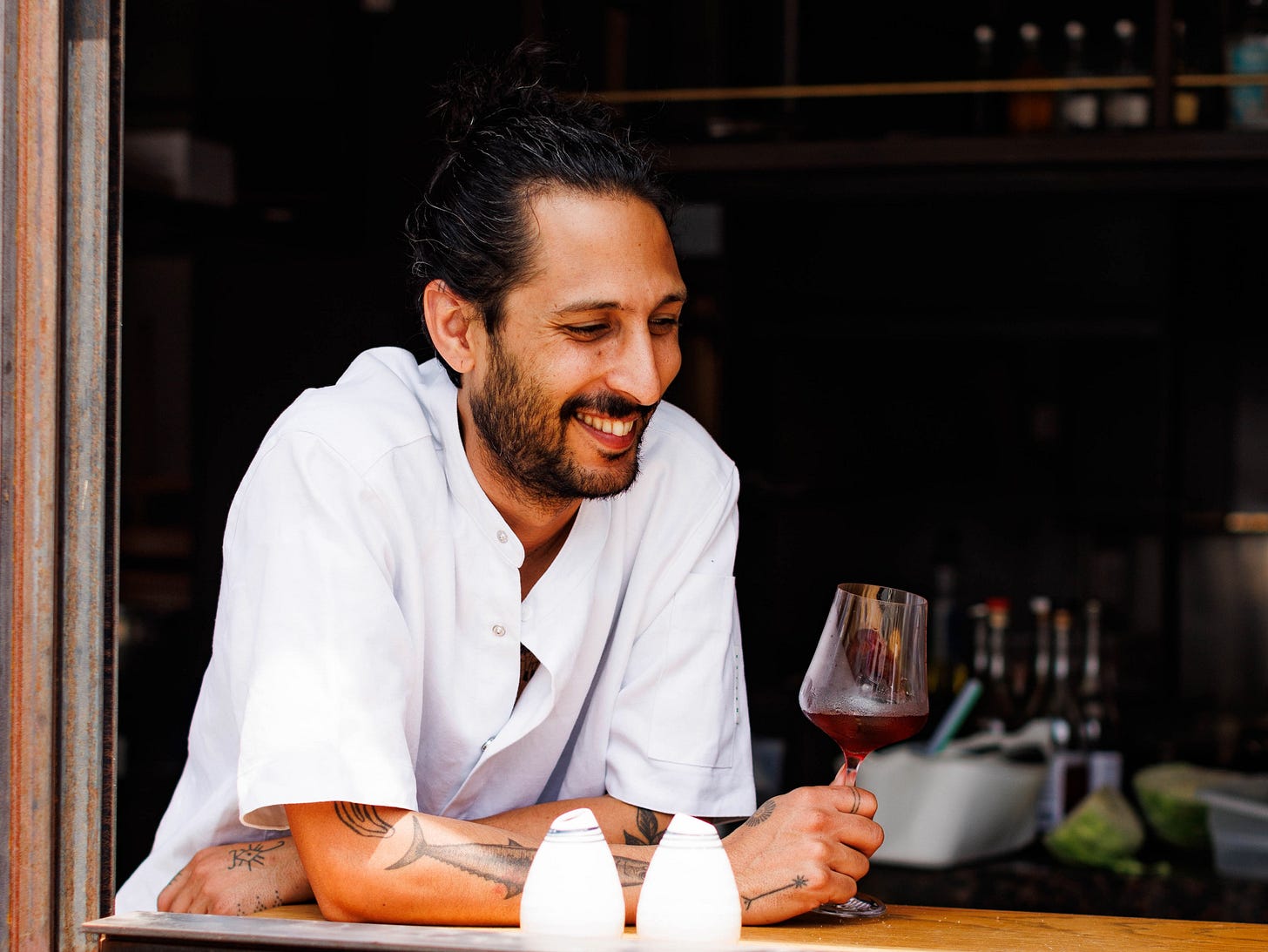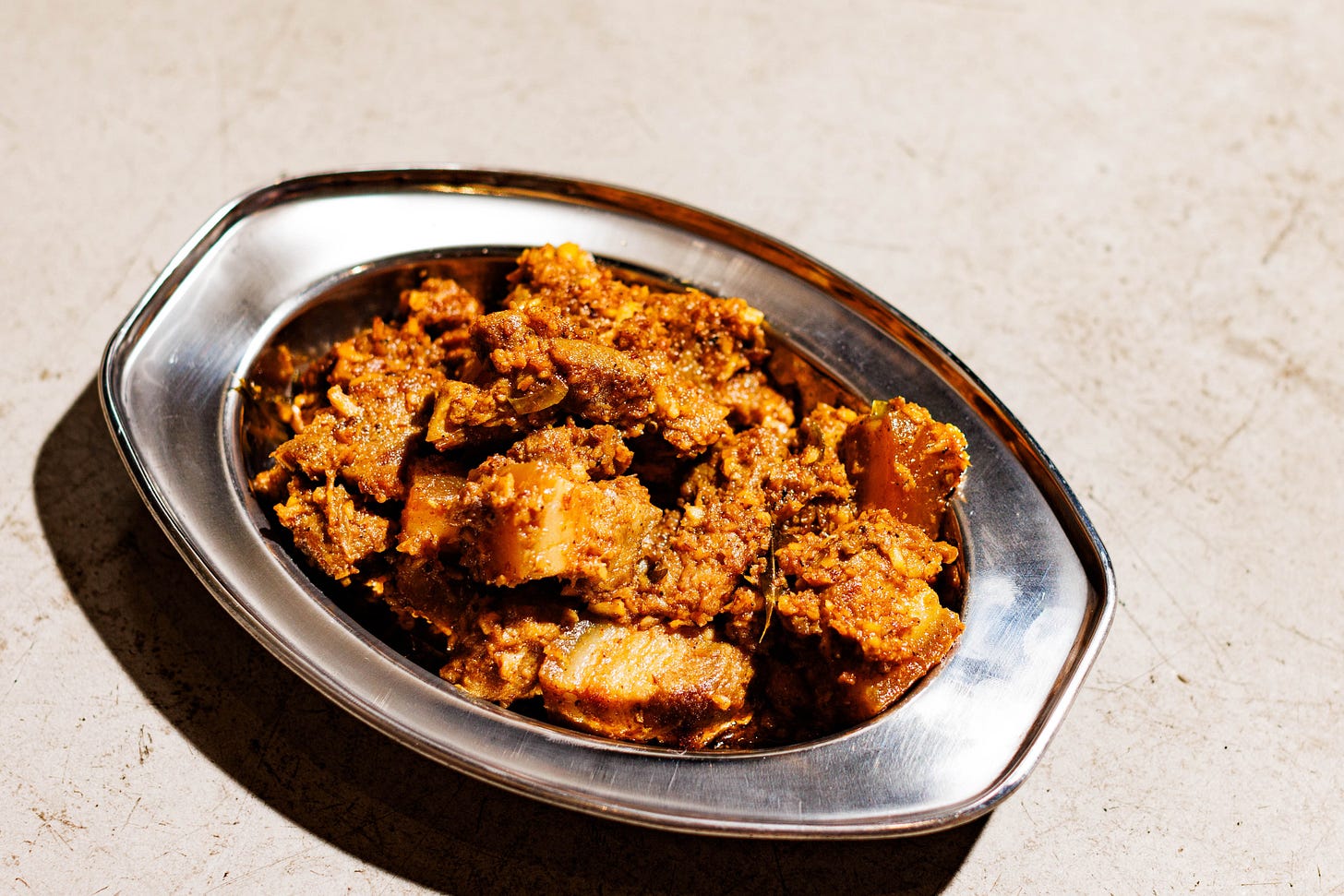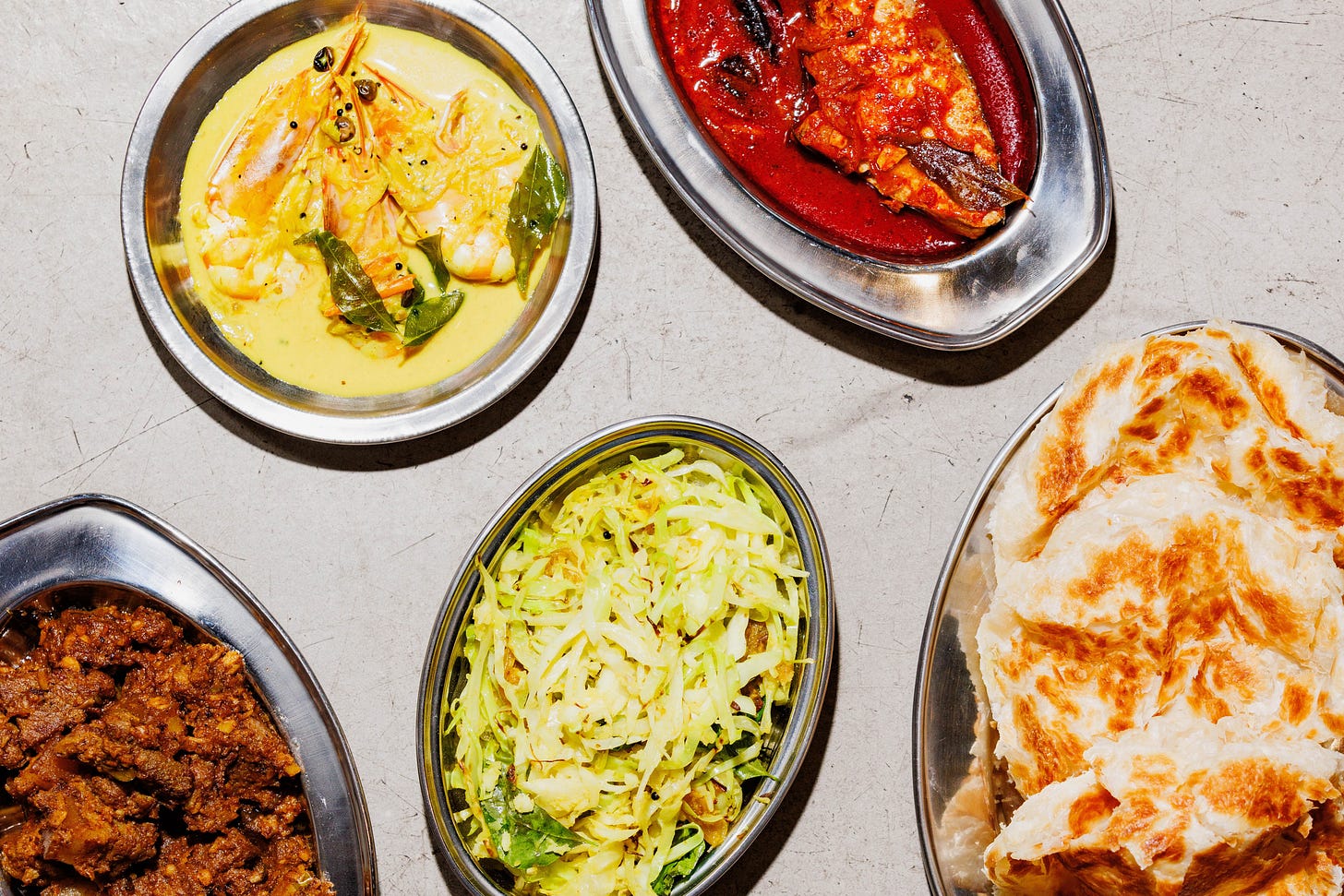Mischa Tropp on His Accidental Career
Melbourne's rising star of Keralan cooking talks to Bureau about his unorthodox rise to restaurant owner, the soul of South Indian cooking, and his first restaurant, Toddy Shop by Mathanden Hotel.
“I guess I accidentally fell into cooking Indian food. I got back from the UK 10 years ago, and I decided to do a pop-up”.
If you know Mischa Tropp, it’s no surprise his first foray into the restaurant business was a pop-up. Tropp has made his name as one Melbourne’s most exciting young kitchen voices through a series of temporary restaurants and guest series across the state.
“I cooked a bunch of Indian food and sold it, down at Tom Boy on Smith Street. Some guys were like, ‘it’s delicious, but it’s not Keralan food’. I was young, and I was like, fuck…I have no idea what I’m talking about”
His first trip to India came in 2014. “That was the start of me pivoting from being a young kid who just did whatever they wanted, to being like, if I want to be good at something, I’ve gotta be better”. From there, a successful residency at The Rochester Hotel in Fitzroy put Tropp on the Melbourne food mafia’s radar. His elegant and refined take on Keralan cuisine was a breath of fresh air, introducing many to the lighter, spicier and more coconut-centric flavours of India’s south.
It was the start of a journey that has finally led Tropp to his first permanent restaurant, Toddy Shop by Mathanden Hotel, set to open its doors this Friday, in the space previously occupied by MonoXO. “I looked for sites for a year and a half. Out of six I looked at, I’d signed heads of agreement on three. I bought a business, and they wouldn’t transfer the lease. But when this site came up, it wasn’t appropriate for some of the other things I was going to do. For me, there’s many versions of Indian food that are good enough, and this concept worked for this site”. The 30 seat diner, just off Smith Street, is a frenzy of activity as I meet with Mischa. Tradesmen come and go, walls still being painted, an exciting clutter of possibilities. Tropp has a calm and gentle air, but you can feel his eagerness to finally open. “At the time, it was like, ‘create the concept that fits this site’. Toddy Shop wasn’t quite what I planned on doing, but now I’m really excited to do this. I think, in some ways, this is more interesting than doing a more modern Indian restaurant. Definitely for the Indian community. Even in the week of launch, the response from the Indian community has been very passionate”.
Since 2014, Tropp has returned to India at least once a year, including an extended 13 month period during the pandemic. “Toddy Shop is me going back to cooking very traditional Indian food. It’s my belief that 95% of the time, traditional cooking is way better than modern cooking. I’m at the point in my career where I do it really well, and I can present in a way without garnishes, on a simple plate, and it’s still value. Because it’s fucking delicious.”
So where does the name “Toddy Shop'' come from? And, more specifically, what does it actually mean? “In Kerala, Toddy Shops are local drinking holes, a bit of a dive, predominantly full of men, that have become famous for their food”. Toddy, to those uninitiated, refers to a type of cheap, rapidly maturing alcohol made from palm sap. “It literally ferments from 1% to 4% in 24 hours. It’s the cheapest alcohol in the world.” Typically a meeting place for people from poorer populations, Toddy Shops are where communities eat and drink together. “And that style of food, is fucking incredible” says Tropp, pausing dramatically for effect.
The style you’ll encounter at Toddy Shop won’t be something immediately familiar to Australian palates, and indeed will buck most of the trends of modern dining. You won’t find the requisite snacks, small plates and desserts, just simplified and elegant variations on a few core Keralan styles of cooking. There’s “fry”, a dish where meat or fish is cooked until all of the moisture and fat is released, then caramelised to create a bouncy, deeply coloured dish. “The opening menu has pork fry. To me, when I go to India, that’s what a lot of South Indians crave. That’s one style I’ll always rotate something through”.
Dishes like moilee, a fragrant prawn broth, and Tropp’s signature istu fish stew reflect the fundamental role coconut plays in Keralan cuisine. “They either come from a little bit of Western influence, or they come from the Syrian Christian community. There will only ever be one of these style dishes on the menu at one time”. Then there’s “roasts”, or wet curry, and dishes made from intensely cooked, almost burnt coconut. “It’s a mixture of a few different styles. Every day I’ll put one new dish and rotate on and off. I know the cuisine well enough that I can look at a recipe and know where I need to take things. And people are already people telling me they want stuff”. Tropp’s insistence on keeping it small is about paying homage to the traditional preparations that have inspired him. “When I cook a dish, I always have a memory of what the best version I’ve ever eaten is. Sometimes I’ve matched it, sometimes I haven’t figured out how to get there, and I won’t serve it. Until I get to that standard or close to it, I just refuse to do it, because I don’t think it represents what I want to be doing”.
Was the decision to base the restaurant on such an indelible and romantic concept by design? After all, tapping into the concept of the Toddy Shop will certainly create a visceral, nostalgic reaction for South Indians. “It’s part of it, but it would work anyway, whatever the name was; it’s more the people cooking the food that they actually want to eat.” says Tropp, earnestly. “Indians in Australia don’t miss eating modern Indian food. They miss eating food that tastes like home”. Tropp speaks with the clarity and passion of someone many years his senior, and never more intensely than when speaking about the Indian experience. “For them, they feel they’re represented in a way that they may not be in the media all the time. The media doesn’t always write about regional Indian food; it’s not celebrated all the time. So it’s representation, and it’s the fact that this type of food drives an emotional response. This is something that people crave”.
So how does someone execute the sort of soulful, simple food Tropp plans to, in an environment where the public increasingly expects an elevated dining experience? Why doesn’t regional Indian food translate to fine dining? “I would disagree with that” says Tropp. “A lot of the versions of elevated dining you see is French food with Indian identities layered over the top of it, or its old royal cuisines that aren’t very well known that could be considered fine dining. But, there’s just so little knowledge, outside of a few royal families, that it hasn’t really transferred across. But now, we’ve got all these amazing young chefs coming up that have worked in hatted and starred restaurants. It will get there. It just hasn’t happened yet”.
Now that the location and concept are nailed down, what is driving Tropp forward? The daunting task of opening and helming your own full time permanent restaurant represents an ominous challenge, particularly with the state of the current financial climate. “I was only ever a chef to cook Indian food.” he says. “That’s why I did all the events, because I never became a chef to do Western food. I just learnt to be a chef to get good enough to cook the food that I wanted to cook”. It’s the sort of simplified ethos that will serve Tropp well in the coming months. Already, there’s a building excitement around Tropp’s concept, and a South Indian community underserved by modern restaurants, who can’t wait to get to Toddy Shop. Separate from any PR campaign or industry hype, Tropp’s food is already connecting to this community on an emotional level. “There will be some people who feel like they have ownership of this shop. And I think that’s important”.
The creation of Toddy Shop by Mathanden Hotel has been deeper than simply building a menu that is broadly appealing and profitable; to Tropp, Toddy Shop represents the culmination of a lifetime of entrepreneurial spirit, risk taking, and exploration. He admits that a life of working for others was never for him. “Sometimes it’s not particularly challenging working for other people. You try things, and for short periods of time you can learn things, but you’re there to fill a role, right? And at a certain point, that role is rote. I find that I switch off at a certain point. It’s like your value is being a cog. And at that point I’m not a very good employee”.
Toddy Shop by Marthanden opens this Friday, December 1st at 5pm, on a walk-in only basis.
Rear 191 Smith Street, Collingwood (enter via Charles Street)
@toddyshop.local







Great writing. I haven’t been this excited about eating at a restaurant from reading an article in a very long time. Bummed I live so far away